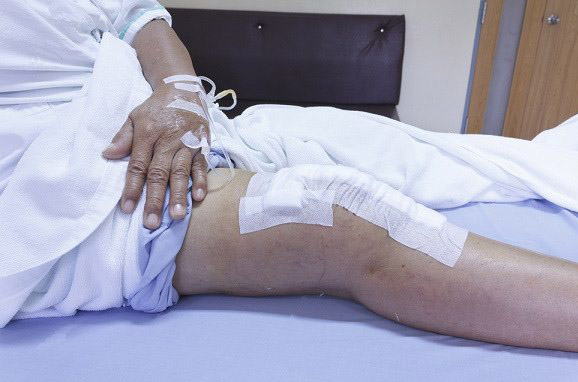What is Knee Replacement Surgery?
Knee replacement surgery is a medical procedure that is performed by replacing a damaged knee joint with an artificial knee joint (prosthetic). The aim is to relieve pain and restore the function of the knee joint, so that patients can still use their knees as usual.
Knee joints can be damaged by injury or inflammation (arthritis), which can prevent patients from carrying out daily activities. Damaged knee joints will cause knee pain when on the move, such as walking, climbing stairs, sitting or lying down.
Before undergoing knee replacement surgery, firstly patient will do non-surgical treatment. The treatment can be in the form of giving drugs or providing a buffer device to help patient moves using their knees.
If the non-surgical treatment method is ineffective in relieving pain. Patient can undergo knee replacement surgery. The doctor will inform the patient when to undergo this procedure.
The patient’s knee joint that has been damaged will be replaced using a prosthetic joint made of metal. Through knee replacement surgery, the doctor will replace the tip of the femur, shin, calf and kneecap with the prosthetic. Patients who undergo this procedure are usually elderly patients or patients who suffer from severe arthritis.
Knee Replacement Surgery Indications
A common cause of someone has to undergo knee replacement surgery is arthritis. There are some types of arthritis:
Rheumatoid arthritis occurred when a person’s knee joint has chronic inflammation due to an autoimmune disease which causes the knee to become difficult to function.
Osteoarthritis occurred when a person’s knee joint becomes inflamed due to an increase in age (degeneration). This condition is mostly experienced by the elderly. But in some cases, it also occurs at a young age.
Post-traumatic arthritis. This type of arthritis can occur due to serious injury to the knee joint.
People with arthritis of the knee will find it difficult to carry out activities that rely on the knee, such as walking, climbing stairs, or getting up from a sitting, squatting, and sleeping position. If arthritis is severe enough, knee pain will still be felt even if the patient is not using his knee, for example when resting.
Before undergo knee replacement surgery, doctor will recommend patients to undergo treatment without surgery. For example, through the provision of medicines, among others:
- Non-steroidal anti-inflammatory drugs.
- Corticosteroids.
- Joint supplements, such as glucosamine or chondroitin sulfate.
Knee Replacement Surgery Warning
Not all patients with knee arthritis can undergo knee replacement surgery. Some conditions that cause an arthritis patient cannot undergo this procedure, including:
- Suffering from septic arthritis.
- Suffering from severe vascular disease.
- Having an infection, even though the location of the infection is not at the knee or near the knee.
- Suffering from a functional abnormality in the leg muscles.
There are also conditions that cause patients with arthritis of the knee joint to undergo surgery with special treatment or supervision, including:
- Patients with obesity.
- Having history of osteomyelitis around the knee.
- Having a condition or skin disease that can interfere with the results of surgery, such as psoriasis.
Knee Replacement Surgery Preparation
The patient will first undergo an examination to ensure the knee replacement surgery is needed. Examinations that can be undertaken by patients include:
- General medical examination
- General examination of physical conditions
- X-ray
- Blood test
- MRI
- CT scan
If based on the examination the patient is required to undergo knee replacement surgery. The doctor will inform the patient about the surgical procedure. The doctor will also ask patient to stop taking certain drugs, especially blood thinners.
Furthermore, doctor will inform you of the type of anesthesia that will be used during surgery. If the patient has an allergic reaction to the anesthetic, the patient must notify the doctor before the surgery is carried out.
About 8 hours before surgery, patient will be asked to fast by a doctor. If the patient is pregnant or planning a pregnancy, you should discuss with your doctor about the pregnancy.
Patient can also begin the exercise using a walker during the preparation period. So, when the recovery period coming, the patient already familiar with the tool. Patient will be given antibiotics before, during, and after surgery to prevent infection, and sedatives to help patients stay relaxed and calm during surgery.
*USA Health Articles does not provide health advice, diagnosis or treatment.

































